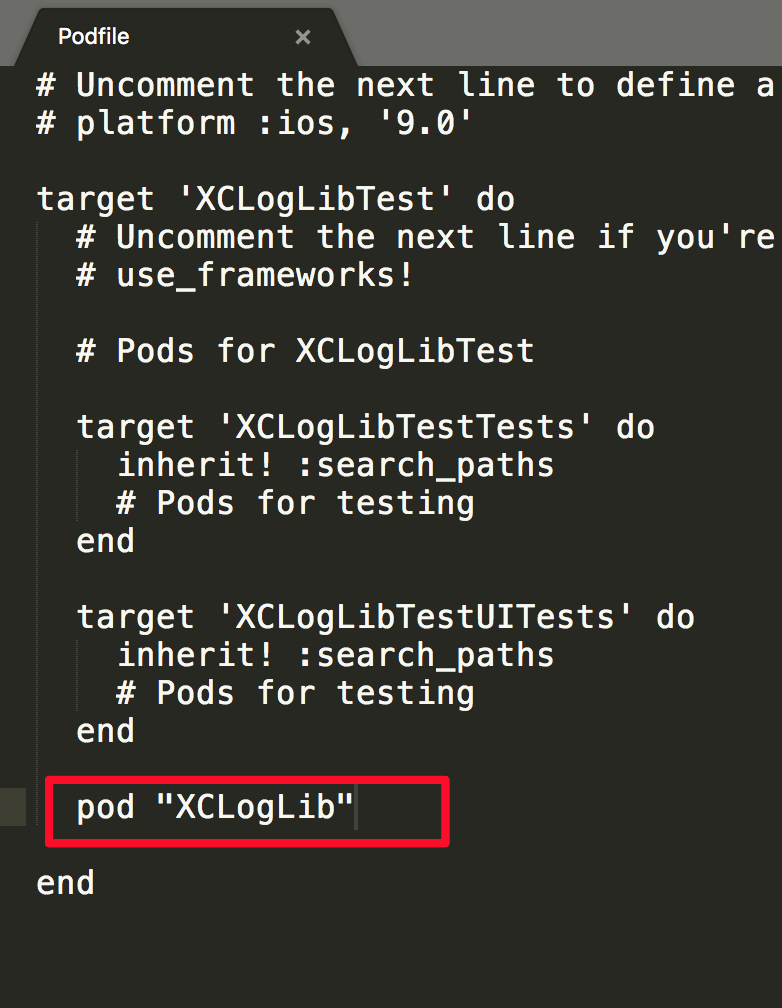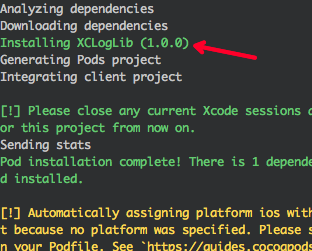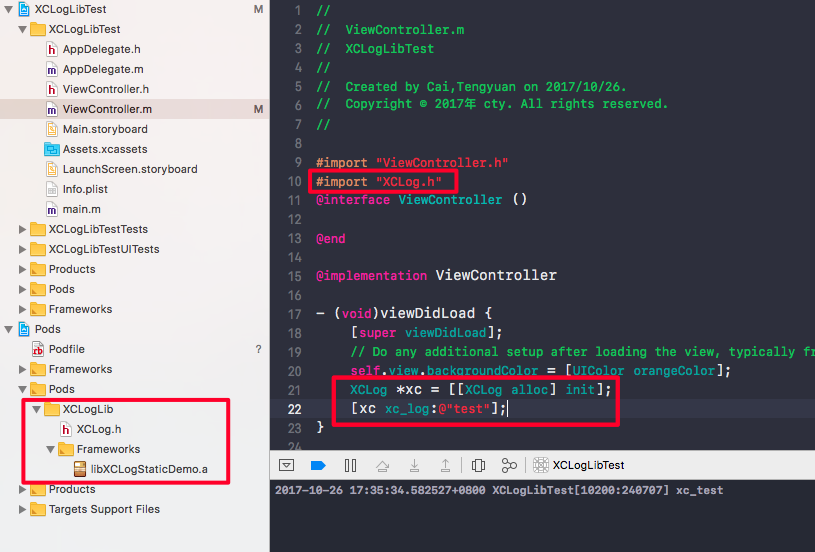cocoaPods管理自己的静态库供其它人下载使用(直接使用上一篇用cocoaPod打包的静态库)
(1) 创建github仓库
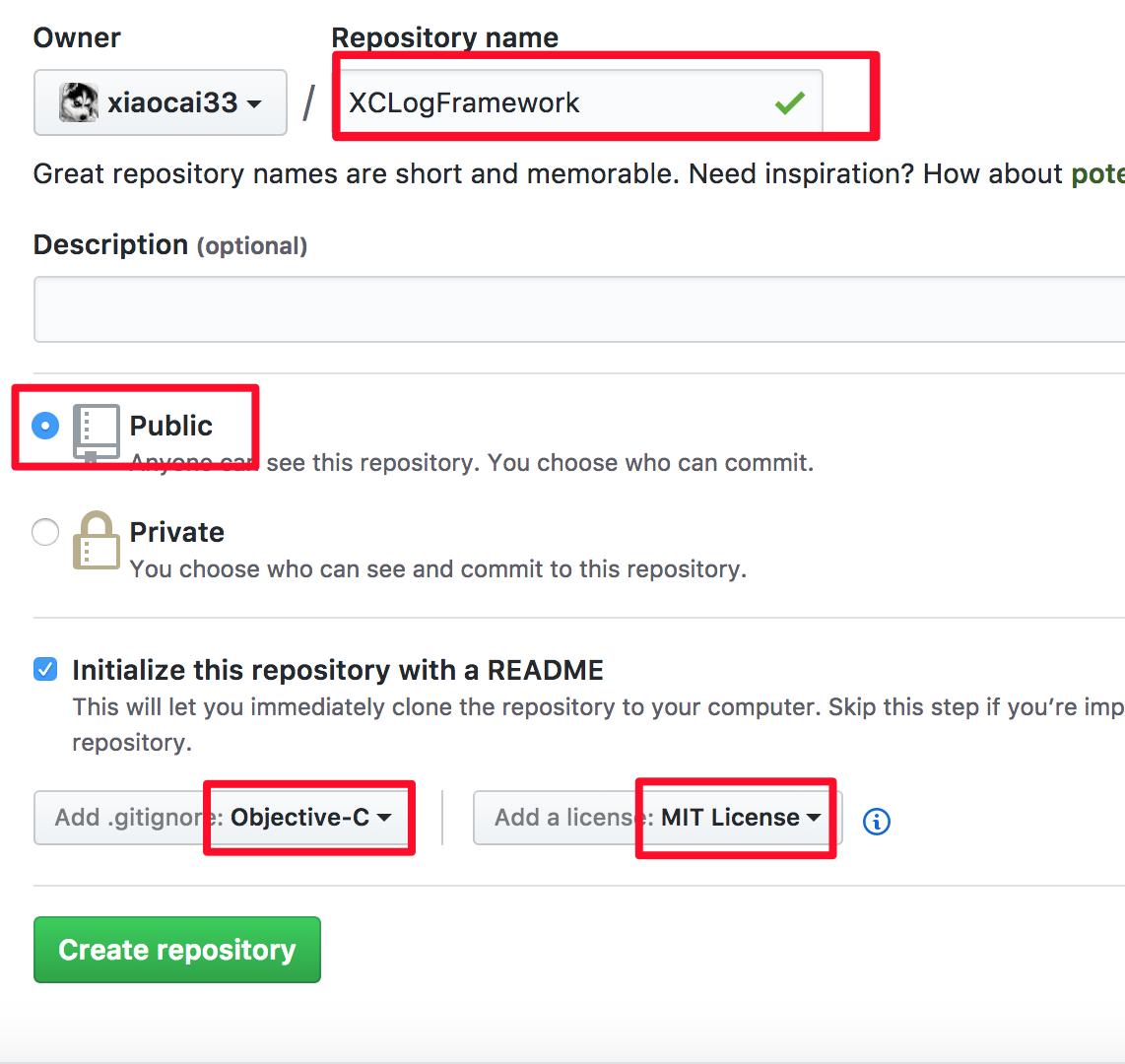
(2) 下载仓库到本地

(3) 将打包好的framework放到项目中
(4) 终端提交到github上
git add . git commit -m “install” git push origin master
(5) 打标签, 并提交到github上
git tag 1.0.0 git push origin 1.0.0
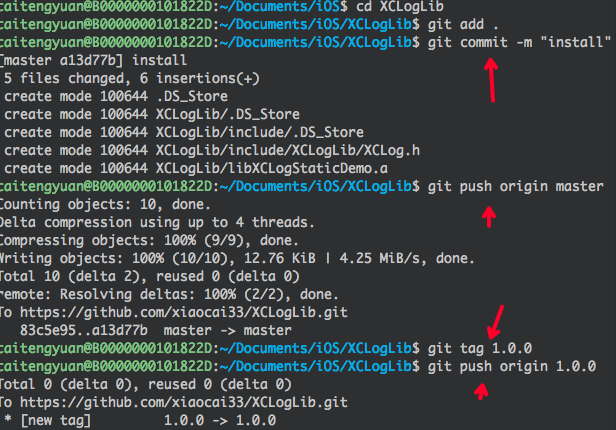
二 (1) 在工程根目录初始化一个Podspec文件, 最好与项目同名

(2) 配置文件
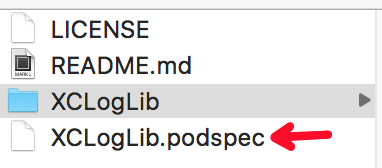
# # Be sure to run `pod spec lint XCLogLib.podspec' to ensure this is a # valid spec and to remove all comments including this before submitting the spec. # # To learn more about Podspec attributes see http://docs.cocoapods.org/specification.html # To see working Podspecs in the CocoaPods repo see https://github.com/CocoaPods/Specs/ # Pod::Spec.new do |s| # ――― Spec Metadata ―――――――――――――――――――――――――――――――――――――――――――――――――――――――――― # # # These will help people to find your library, and whilst it # can feel like a chore to fill in it's definitely to your advantage. The # summary should be tweet-length, and the description more in depth. # s.name = "XCLogLib" s.version = "1.0.0" s.summary = " XCLogLib test demo" # This description is used to generate tags and improve search results. # * Think: What does it do? Why did you write it? What is the focus? # * Try to keep it short, snappy and to the point. # * Write the description between the DESC delimiters below. # * Finally, don't worry about the indent, CocoaPods strips it! s.description = <<-DESC A Test XCLogLib Demo. where you can put your description. DESC s.homepage = "https://github.com/xiaocai33/XCLogLib" # s.screenshots = "www.example.com/screenshots_1.gif", "www.example.com/screenshots_2.gif" # ――― Spec License ――――――――――――――――――――――――――――――――――――――――――――――――――――――――――― # # # Licensing your code is important. See http://choosealicense.com for more info. # CocoaPods will detect a license file if there is a named LICENSE* # Popular ones are 'MIT', 'BSD' and 'Apache License, Version 2.0'. # #s.license = "MIT (example)" s.license = { :type => "MIT"} # ――― Author Metadata ――――――――――――――――――――――――――――――――――――――――――――――――――――――――― # # # Specify the authors of the library, with email addresses. Email addresses # of the authors are extracted from the SCM log. E.g. $ git log. CocoaPods also # accepts just a name if you'd rather not provide an email address. # # Specify a social_media_url where others can refer to, for example a twitter # profile URL. # s.author = { "Cai Tengyuan" => "tycai1@baidu.com" } # Or just: s.author = "Cai Tengyuan" # ――― Platform Specifics ――――――――――――――――――――――――――――――――――――――――――――――――――――――― # # # If this Pod runs only on iOS or OS X, then specify the platform and # the deployment target. You can optionally include the target after the platform. # # s.platform = :ios s.platform = :ios, "8.0" # When using multiple platforms # s.ios.deployment_target = "5.0" # s.osx.deployment_target = "10.7" # s.watchos.deployment_target = "2.0" # s.tvos.deployment_target = "9.0" # ――― Source Location ―――――――――――――――――――――――――――――――――――――――――――――――――――――――――― # # # Specify the location from where the source should be retrieved. # Supports git, hg, bzr, svn and HTTP. # s.source = { :git => "https://github.com/xiaocai33/XCLogLib.git", :tag => "#{s.version}" } # ――― Source Code ―――――――――――――――――――――――――――――――――――――――――――――――――――――――――――――― # # # CocoaPods is smart about how it includes source code. For source files # giving a folder will include any swift, h, m, mm, c & cpp files. # For header files it will include any header in the folder. # Not including the public_header_files will make all headers public. # s.source_files = "XCLogLib", "XCLogLib/**/*.{h}" #s.exclude_files = "Classes/Exclude" s.vendored_libraries = "*/libXCLogStaticDemo.a" # framework is #s.vendored_frameworks = '*/XCLogStaticDemo.framework' # s.public_header_files = "Classes/**/*.h" # ――― Resources ―――――――――――――――――――――――――――――――――――――――――――――――――――――――――――――――― # # # A list of resources included with the Pod. These are copied into the # target bundle with a build phase script. Anything else will be cleaned. # You can preserve files from being cleaned, please don't preserve # non-essential files like tests, examples and documentation. # # s.resource = "icon.png" # s.resources = "Resources/*.png" # s.preserve_paths = "FilesToSave", "MoreFilesToSave" # ――― Project Linking ―――――――――――――――――――――――――――――――――――――――――――――――――――――――――― # # # Link your library with frameworks, or libraries. Libraries do not include # the lib prefix of their name. # # s.framework = "SomeFramework" # s.frameworks = "SomeFramework", "AnotherFramework" # s.library = "iconv" # s.libraries = "iconv", "xml2" # ――― Project Settings ――――――――――――――――――――――――――――――――――――――――――――――――――――――――― # # # If your library depends on compiler flags you can set them in the xcconfig hash # where they will only apply to your library. If you depend on other Podspecs # you can include multiple dependencies to ensure it works. s.requires_arc = true # s.xcconfig = { "HEADER_SEARCH_PATHS" => "$(SDKROOT)/usr/include/libxml2" } # s.dependency "JSONKit", "~> 1.4" end
(3) 创建账号(如果已经创建过, 省略)
pod trunk register 邮箱 联系人 --description="描述" --verbose
创建成功会收到邮件,进邮箱验证
pod trunk me 可查看trunk信息
(4) trunk push之前要先验证
pod spec lint XCLogLib.podspec
出现 XCLogLib.podspec passed validation表示通过了
如果只是waring通过
pod lib lint --allow-warnings #强制忽略
如何 想看错误详情
pod spec lint XCLogLib.podspec --verbose
如果有错, 看下配置文件哪里错了.

(5) pod trunk push 这个有点耐心, 需要会时间
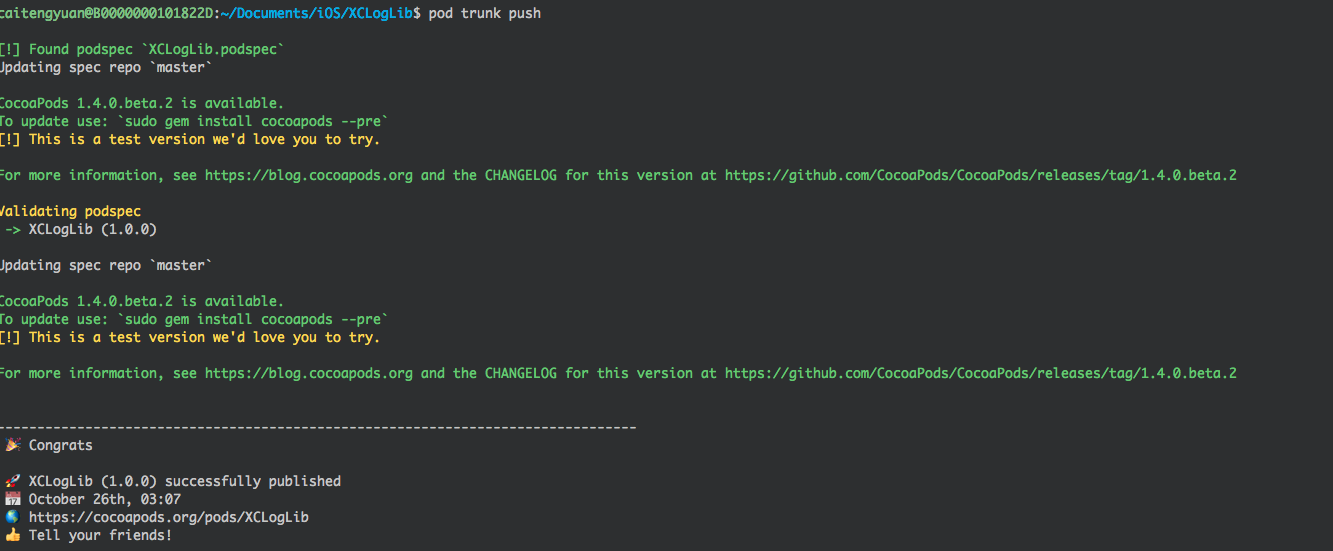
(6) 成功后pod search XCLogLib

如果搜索不到, 请看上篇博客介绍.
(7) 在其它项目的 Podfile 中引用:
platform :ios, ‘8.0' 注意版本要大于静态库支持的最低版本
pod ‘XCLogLib'
或者 pod ‘XCLogLib’, '~> 1.0.0’
这样就可以在demo中引用头文件
#import “XCLog.h”
然后调用静态库的方法了.
如果是framework的框架, 则需要将配置文件的
s.vendored_libraries = “*/libXCLogStaticDemo.a"
改为 (注意路径)
s.vendored_frameworks = ‘*/XCLogStaticDemo.framework'
即可, 这里不再演示
三 xcode项目支持pod
终端:
cd path #到项目目录
pod init fileName.Podfile #创建 Podfile 文件
打开文件在其中添加需要依赖的库
例:
pod ‘XCLogLib’
例子:
